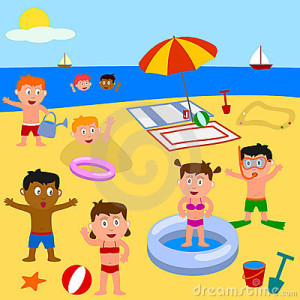During the summer months we need to take some added precautions to keep children safe in the sun and by the water. Here are some good tips:
• Avoid long periods of sun exposure especially between 10am and 4pm
• Apply sunscreen of at least 15 SPF that protects against both UVA and UVB rays on both sunny and cloudy days. (Host family should approve and provide the type they prefer).
• Infants should be dressed in lightweight clothing covering as much skin as possible and brimmed hats to shade the face.
• Stay hydrated, drink water throughout the day.
• Intense activities and sports should be reduced whenever high heat and humidity reach critical levels.
• NEVER leave children or animals in a car unattended. Not even for a moment. Tragic results can occur.

• Actively supervise children in and around the water, giving them your undivided attention. Appoint a designated “water watcher,” taking turns with other adults. Be very clear who is in charge.
• When in the water there should be an adult at arm’s length from young children at all times.
• Children who cannot swim or who are not strong swimmers should wear water wings or life jackets when in the water.
• Swim in designated areas supervised by lifeguards.
• Always swim with a buddy; do not allow anyone to swim alone. Even at a public pool or a lifeguarded beach, use the buddy system!
• If you go boating, wear a life jacket!
• Secure your personal belongings. Be aware of your surroundings.
Insects, Ticks and Snakes
Summertime brings an onslaught of bugs- some of which can cause diseases like West Nile Virus, Lyme disease and Rocky Mount Spotted Fever. Stay up-to-date on your region and how to prevent these diseases spread by insects.
• Do a tick check after being outdoors.
• Learn how to identify the poisonous snakes in your area.
• If traveling in unfamiliar areas, be aware of where local emergency medical care can be found.
Prepare a summer first-aid kit for bug bites and more.
• Benadryl is probably the most important over-the-counter medication to have in your first aid kit to treat insect bites, hives, and other allergic reactions. Include dosing instructions for each child.
• Hydorcortisone ointment can help the itches that come from bites.
• Use bug spray containing DEET or picaridin (ask your Host Parents what they want you to use)
• Simple antibiotic ointment or spray
• Bandages of varying sizes
• Chemical ice packs
• Scissors
• Hand wipes
Emergency contact info
• As well as the host parent’s numbers, au pairs should have the phone number of the Community Counselor and the Au Pair in America 800 number saved to their phones.
• Additionally, add the non-emergency numbers for the local police departments (anywhere the au pair routinely travels). This way if they need assistance they can quickly and easily dial the number.
• If your area is served by a Code Red Weather Alert type program please consider adding that as well.
• Remind your au pairs to call immediately if there is any issue with a child in their care. Host families should make sure that au pairs know what to do if there is an emergency situation while they are in charge of the children. This is a good time of year to review any family rules that apply to summer activities especially by the pool and while at the beach.
